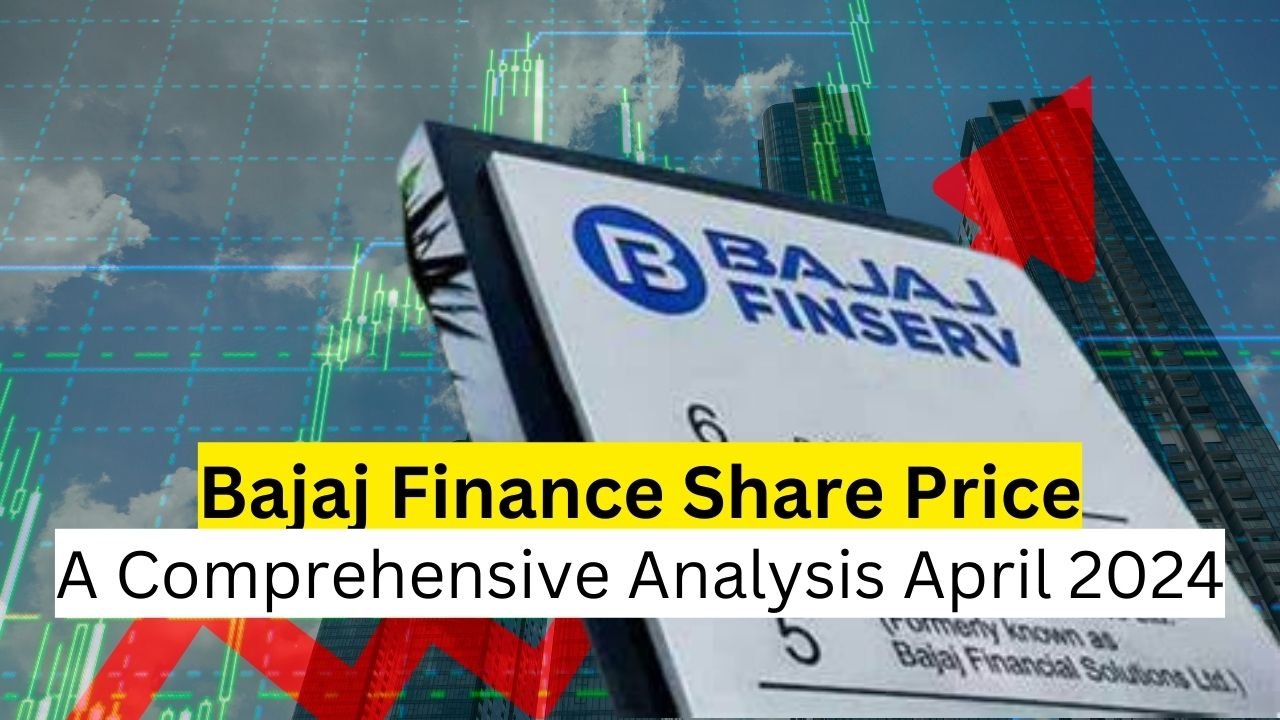Bajaj Finance Share Price: A Comprehensive Analysis April 2024
Posted on : April 28, 2024 By Savan

Bajaj Finance Ltd has been a beacon of robust performance in the Non-Banking Financial Company (NBFC) sector. With a diverse portfolio that includes consumer financing, SME lending, commercial lending, and wealth management, Bajaj Finance has carved out a significant niche in the Indian financial landscape.
Bajaj Finance Share Price
Based on the latest information available as of April 28, 2024, here is an updated snapshot of Bajaj Finance Share Price:
Current Market Position
As of the most recent trading session, Bajaj Finance’s shares have seen a price adjustment. The company’s shares last traded at ₹7294.90, reflecting market responses to the latest quarterly results.
Share Price Performance
| Metric | Value |
| Current Price | ₹7294.90 |
| Day’s Low-High | ₹6691.5-7000.0 |
| 52 Week Low-High | ₹5877.0-8192.0 |
| Volume | 1,173,354 |
| Market Cap | ₹4,53,671.69 Cr |
| P/E Ratio | 32.91 |
| Dividend Yield | 0.41% |
The table reflects the company’s share price performance with updated metrics.
Financial Health
Bajaj Finance’s financial health remains robust, with a P/E Ratio of 32.91, indicating sustained investor confidence1. The market capitalization has adjusted to ₹4,53,671.69 crore, maintaining its significant market presence1.
Yearly Growth
The company continues to exhibit a strong growth trajectory, with its share price having reached an all-time high of ₹8192.01.
Lok Sabha Elections 2024: First Phase Voting Begins Across India
Future Outlook
The outlook for Bajaj Finance Share Price remains positive, with expectations of growth driven by strategic initiatives and a strong financial services ecosystem. The company’s focus on digital transformation and customer-centric products is anticipated to enhance its market position further.
Key Factors Affecting Share Price
The factors influencing Bajaj Finance’s share price continue to be multifaceted. Strategic execution, regulatory environment, market conditions, financial performance, and competition remain critical elements that investors monitor closely.
For a detailed view of Bajaj Finance’s performance and strategic direction, including the impact of regulatory actions and the company’s 3i execution strategy, you can refer to their Q4 FY24 Investor Presentation.
Please note that Bajaj Finance Share Prices are subject to market volatility and investor sentiment, and the information provided here is based on the latest available data as of April 28, 2024.
What are the key factors affecting Bajaj Finance’s share price?
The key factors affecting Bajaj Finance Share Price are multifaceted, reflecting the complex interplay of market dynamics, company performance, and external influences. Here are some of the primary factors:
- Strategic Execution:
Bajaj Finance’s ability to flawlessly execute its strategic plans is a significant strength. The company’s execution capabilities are as robust as ever, which is crucial for maintaining investor confidence and driving share price.
- Near-Term Challenges:
Various challenges such as RBI actions on EMI and E-commerce cards, management succession and transition plans, and the listing of the housing subsidiary have been identified. Resolutions for these issues are expected within the next year, which could impact the share price.
- 3i Execution Strategy:
Continuing with its 3i execution strategy (Invent, Innovate, Imitate), Bajaj Finance is well poised to deliver a consolidated asset under management (AUM) Compound Annual Growth Rate (CAGR) of 25% and The compound annual growth rate (CAGR) of consolidated profit after tax (PAT) is projected at 21.4% from FY24 to FY27.
- Regulatory Environment:
Regulatory actions or the prolonged duration of existing regulatory actions can affect the share price. For instance, the RBI ban on certain products had a notable impact on Bajaj Finance’s Capital to Risk-Weighted Assets Ratio (CRAR).
- Market Conditions:
General market conditions, including investor sentiment, economic indicators, and global financial trends, play a role in the share price movement.
- Financial Performance:
Quarterly and annual financial results, especially net profit, asset quality, and net interest margins, can influence the Bajaj Finance Share Price. A deviation from analyst expectations can lead to price volatility.
- Competition:
The intensity of competition in key segments, especially from new entrants in the consumer financing space, can affect the share price.
- Operational Expenditure:
Elevated operational expenditure and margin contraction are considered negatives for the company and can put downward pressure on the share price.
These factors, along with others such as global economic shifts, policy changes, and industry trends, contribute to the fluctuations in Bajaj Finance Share Price. Investors closely monitor these aspects to make informed decisions.
Conclusion
Bajaj Finance Share Price reflects its strong market position and growth potential. While market fluctuations are inherent to stock trading, Bajaj Finance’s fundamentals suggest a stable and promising future for investors. With its strategic focus and diversified offerings, Bajaj Finance is well-positioned to navigate the dynamic financial landscape.
Share this articlePosted on : April 28, 2024 By Savan
Join Our Club

"Stay Informed, Stay Ahead – Join Our Club Today!"



















